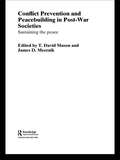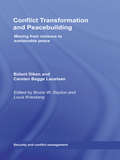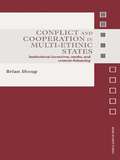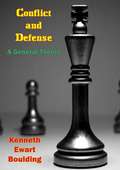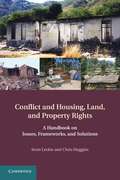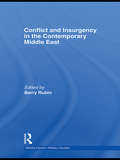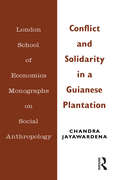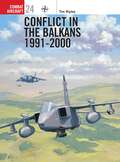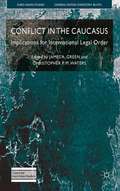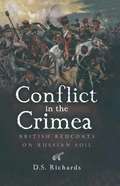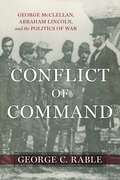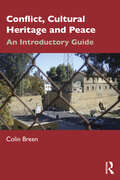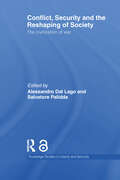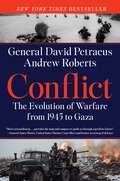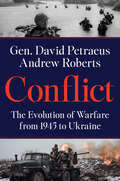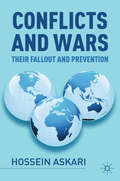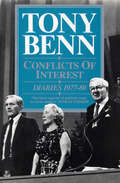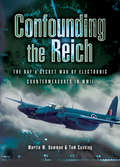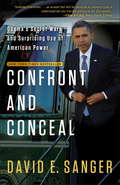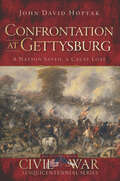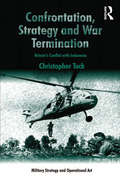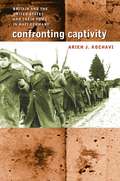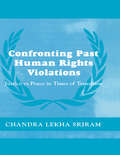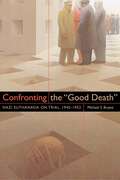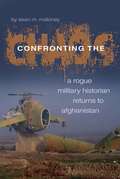- Table View
- List View
Conflict Prevention and Peace-building in Post-War Societies: Sustaining the Peace (Contemporary Security Studies)
by T. David Mason James D. MeernikThis volume provides an overview of the costs, benefits, consequences, and prospects for rebuilding nations emerging from violent conflict. The rationale for this comes from the growing realization that, in the post-Cold War era and in the aftermath of 9/11, our understanding of conflict and conflict resolution has to include consideration of the conditions conducive to sustaining the peace in nations torn by civil war or interstate conflict. The chapters analyze the prospects for building a sustainable peace from a number of different perspectives, examining: the role of economic development democratization respect for human rights the potential for renewal of conflict the United Nations and other critical topics. In an age when 'nation-building' is once again on the international agenda, and scholars as well as policy makers realize both the tremendous costs and benefits in fostering developed, democratic, peaceful and secure nations, the time has truly come for a book that integrates all the facets of this important subject. Conflict Prevention and Peace-building in Post-War Societies will appeal to students and scholars of peace studies, international relations, security studies and conflict resolution as well as policy makers and analysts.
Conflict Transformation and Peacebuilding: Moving From Violence to Sustainable Peace (Routledge Studies in Security and Conflict Management)
by Louis Kriesberg Bruce W. DaytonThis book seeks to examine the causes of escalation and de-escalation in intrastate conflicts. Specifically, the volume seeks to map the processes and dynamics that lead groups challenging existing power structures to engage in violent struggle; the processes and dynamics that contribute to the de-escalation of violent struggle and the participation of challengers in peaceful political activities; and the processes and dynamics that sustain and nurture this transformation. By integrating the latest ideas with richly presented case studies, this volume fills a gap in our understanding of the forces that lead to moderation and constructive engagement in the context of violent, intrastate conflicts. This volume will be of great interest to students of conflict management, peace studies, conflict resolution, ethnic conflict and security studies in general.
Conflict and Cooperation in Multi-Ethnic States: Institutional Incentives, Myths and Counter-Balancing (Asian Security Studies)
by Brian ShoupInterethnic competition in plural societies is often characterized by acounterbalance of political and economic strength between different groups. In such cases, tensions emerge as politically dominant groups fear loss of hegemony to more economically aggressive groups. Likewise, economically successful groups require key public goods and a poli
Conflict and Defense: A General Theory
by Kenneth Ewart BouldingConflict and Defense, which was first published in 1962, presents a general theory of conflict, drawing on theoretical analyses from sociology and economics. This text by Kenneth E. Boulding, a pre-eminent economist and founder of ecological economics, examines the common processes of conflict, the roles of different participants in conflicts, and describes features which are unique to specific types of conflict.Conflict and Defense will be of interest to those who seek an improved theoretic understanding of conflict. Divided into sixteen chapters, the book offers both a general theoretic model of conflict, and analyses of the unique features which distinguish international, economic, industrial and ideological conflicts. It is clearly written and will be accessible to the well-informed reader.“The origin of this book in my own mind can be traced back to a passionate conviction of my youth that war was the major moral and intellectual problem of our age. If the years have made this conviction less passionate, they have made it no less intense. The book, therefore, is not a work of that idle curiosity which, according to Veblen, is the motivator of pure science. It is driven rather by that practical curiosity which inspires applied science. Nevertheless, it is a work of pure theory, that is, of the abstract imagination…”—Kenneth E. Boulding
Conflict and Housing, Land and Property Rights
by Scott Leckie Chris HugginsHousing, land and property (HLP) rights, as rights, are widely recognized throughout international human rights and humanitarian law and provide a clear and consistent legal normative framework for developing better approaches to the HLP challenges faced by the UN and others seeking to build long-term peace. This book analyses the ubiquitous HLP challenges present in all conflict and post-conflict settings. It will bridge the worlds of the practitioner and the theorist by combining an overview of the international legal and policy frameworks on HLP rights with dozens of detailed case studies demonstrating country experiences from around the world. The book will be of particular interest to professors and students of international relations, law, human rights, and peace and conflict studies but will have a wider readership among practitioners working for international institutions such as the United Nations and the World Bank, non-governmental organizations, and national agencies in the developing world.
Conflict and Insurgency in the Contemporary Middle East (Middle Eastern Military Studies)
by Barry RubinPolitical violence and instability in the Middle East is arguably the world's most important political issue. The region is certainly the globe's leading area for turmoil, war, and violence; and its conflicts have continuously involved Western countries both directly and indirectly. This book surveys the main conflicts and insurgencies in recent Middle East history, focusing mainly on the period since the 1980s. Taking a historical-analytical approach, it covers challenges from revolutionary groups, civil wars, and the main conventional wars in the region. In addition to providing detailed narratives, the contributors also analyse the lessons for political and military affairs stemming from these conflicts. Conflict and Insurgency in the Contemporary Middle East assembles for the first time detailed studies of the Iran-Iraq, Israel-Hizballah, and the two Coalition-Iraq wars, along with analyses of a number of insurgencies. Assessing successes and failures, strategy and tactics, and changes in military technologies, the book will be of great interest to students of Middle Eastern politics, insurgencies, security studies and International Relations in general, as well as policymakers and military professionals.
Conflict and Solidarity in a Guianese Plantation (LSE Monographs on Social Anthropology #Vol. 25)
by Chandra JayawardenaThis study concerns two communities of sugar plantation labourers, the descendants of indentured immigrants from India, who live in the county of Berbice, British Guiana. The study is focused on the analysis of social conflict: the factors that cause it, the forms it takes and its social consequences.
Conflict in the Balkans 1991-2000
by Mark Rolfe Tim RipleyOsprey's examination of aircraft action in the Balkan region during the Yugoslav Wars (1991-2001) as well as during the conflicts that followed up until 2001. Exposing the true scale and significance of the deployment of air power in the Balkans, this book details the activities of NATO and UN aircraft as well as local pilots in the former Yugoslavia. From bombing by B-2 stealth bombers to air-to-air combat; from moving ground troops by helicopter to 'food-bombing' for refugees, air power has played a vital role in 'Europe's Vietnam', and there is little sign that the fires of conflict are being extinguished. Debate amongst air power practitioners has yielded little agreement as to the degree of damage inflicted on the Yugoslav 3rd Army in Kosovo, the Balkans continue to be a region of conflict and ethnic hatred.
Conflict in the Caucasus: Implications for International Legal Order
by James A. Green Christopher P.M. WatersThis book addresses multiple aspects of the conflict between Georgia and Russia over the breakaway region of South Ossetia in August 2008, including the use of force, human rights, transnational litigation and international law 'rhetoric'. The particulars of the conflict are explored alongside their wider implications for international order.
Conflict in the Crimea: British Redcoats on Russian Soil
by D. S. RichardsThe author relies to a great extent on contemporary accounts of a large number of British men—and women—who were unwittingly caught up in this appalling war. As well as surviving the efforts of their determined enemy, the Russians, they had to overcome the harshest weather, rampant disease and woefully inadequate administrative support. As revealed to a shocked nation by the first war reporters, medical care was largely non-existent and wounded faced the trauma of being left for days without medical attention. This was where Florence Nightingale came in. Battles were prolonged, desperate and hugely costly. The Crimean War was the catalyst for the modernisation of the Army, due to the disgraceful injustice of conditions and lack of leadership and care by many in authority.
Conflict of Command: George McClellan, Abraham Lincoln, and the Politics of War
by George C. RableThe fraught relationship between Abraham Lincoln and George McClellan is well known, so much so that many scholars rarely question the standard narrative casting the two as foils, with the Great Emancipator inevitably coming out on top over his supposedly feckless commander. In Conflict of Command, acclaimed Civil War historian George C. Rable rethinks that stance, providing a new understanding of the interaction between the president and his leading wartime general by reinterpreting the political aspects of their partnership.Rable pays considerable attention to Lincoln’s cabinet, Congress, and newspaper editorials, revealing the role each played in shaping the dealings between the two men. While he surveys McClellan’s military campaigns as commander of the Army of the Potomac, Rable focuses on the political fallout of the fighting rather than the tactical details. This broadly conceived approach highlights the army officers and enlisted men who emerged as citizen-soldiers and political actors.Most accounts of the Lincoln-McClellan feud solely examine one of the two individuals, and the vast majority adopt a steadfast pro-Lincoln position. Taking a more neutral view, Rable deftly shows how the relationship between the two developed in a political context and ultimately failed spectacularly, profoundly altering the course of the Civil War itself.
Conflict, Cultural Heritage and Peace: An Introductory Guide
by Colin BreenConflict, Cultural Heritage and Peace offers a series of conceptual and applied frameworks to help understand the role cultural heritage plays within conflict and the potential it has to contribute to positive peacebuilding and sustainable development in post-conflict societies. Designed as a resource guide, this general volume introduces the multiple roles cultural heritage plays through the conflict cycle from its onset, subsequent escalation and through to resolution and recovery. In its broadest sense, it questions what role cultural heritage plays within conflict, how cultural heritage is used in the construction and justification of conflict narratives, how are these narratives framed and often manipulated to support particular perspectives, and how we can develop better understandings of cultural heritage and work towards the better protection of cultural heritage resources during conflict. It moves beyond the protection paradigm and recognises that cultural heritage can contribute to building peace and reconciliation in post-conflict environments. The study offers a conceptual and operational framework to understand the roles cultural heritage plays within conflict cycles, how it can be targeted during war, and the potential cultural heritage has in positive peacebuilding across the conflict lifecycle. Conflict, Cultural Heritage, and Peace offers an invaluable introduction to cultural heritage at all stages in conflict scenarios which will benefit students, researchers and practitioners in the field of heritage, environment, peace and conflict studies.
Conflict, Security and the Reshaping of Society: The Civilization of War (Routledge Studies in Liberty and Security)
by Salvatore Palidda Alessandro Dal LagoA PDF version of this book is available for free in open access via www.tandfebooks.com as well as the OAPEN Library platform, www.oapen.org. It has been made available under a Creative Commons Attribution-Non Commercial-No Derivatives 3.0 license and is part of the OAPEN-UK research project. This book is an examination of the effect of contemporary wars (such as the 'War on Terror') on civil life at a global level. Contemporary literature on war is mainly devoted to recent changes in the theory and practice of warfare, particular those in which terrorists or insurgents are involved (for example, the 'revolution in military affairs', 'small wars', and so on). On the other hand, today's research on security is focused, among other themes, on the effects of the war on terrorism, and on civil liberties and social control. This volume connects these two fields of research, showing how 'war' and 'security' tend to exchange targets and forms of action as well as personnel (for instance, the spreading use of private contractors in wars and of military experts in the 'struggle for security') in modern society. This shows how, contrary to Clausewitz's belief war should be conceived of as a "continuation of politics by other means", the opposite statement is also true: that politics, insofar as it concerns security, can be defined as the 'continuation of war by other means'. This book will be of much interest to students of critical security studies, war and conflict studies, terrorism studies, sociology and IR in general. Salvatore Palidda is Professor of Sociology in the Faculty of Education at the University of Genoa. Alessandro Dal Lago is Professor of Sociology of Culture and Communication at the University of Genoa.
Conflict: The Evolution of Warfare from 1945 to Gaza
by Andrew Roberts David PetraeusNew York Times, USA Today, Amazon, and Publishers Weekly bestsellerAspects of History, The Critic, Octavian, and Modern War Institute Book of the Year. Two leading authorities—an acclaimed historian and the outstanding battlefield commander and strategist of our time—collaborate on a landmark examination of war since 1945. Conflict is both a sweeping history of the evolution of warfare up to Putin’s invasion of the Ukraine, and a penetrating analysis of what we must learn from the past—and anticipate in the future—in order to navigate an increasingly perilous world.In this deep and incisive study, General David Petraeus, who commanded the US-led coalitions in both Iraq, during the Surge, and Afghanistan and former CIA director, and the prize-winning historian Andrew Roberts, explore over 70 years of conflict, drawing significant lessons and insights from their fresh analysis of the past. Drawing on their different perspectives and areas of expertise, Petraeus and Roberts show how often critical mistakes have been repeated time and again, and the challenge, for statesmen and generals alike, of learning to adapt to various new weapon systems, theories and strategies. Among the conflicts examined are the Arab-Israeli wars, the Korean and Vietnam Wars, the two Gulf Wars, the Balkan wars in the former Yugoslavia, and both the Soviet and Coalition wars in Afghanistan, as well as guerilla conflicts in Africa and South America. Conflict culminates with a bracing look at Putin’s disastrous invasion of Ukraine, yet another case study in the tragic results when leaders refuse to learn from history, and an assessment of the nature of future warfare. Filled with sharp insight and the wisdom of experience, Conflict is not only a critical assessment of our recent past, but also an essential primer of modern warfare that provides crucial knowledge for waging battle today as well as for understanding what the decades ahead will bring.
Conflict: The Evolution of Warfare from 1945 to Ukraine
by Andrew Roberts David PetraeusTwo leading authorities—an acclaimed historian and the outstanding battlefield commander and strategist of our time—collaborate on a landmark examination of war since 1945. Conflict is both a sweeping history of the evolution of warfare up to Putin’s invasion of the Ukraine, and a penetrating analysis of what we must learn from the past—and anticipate in the future—in order to navigate an increasingly perilous world.In this deep and incisive study, General David Petraeus, who commanded the US-led coalitions in both Iraq, during the Surge, and Afghanistan and former CIA director, and the prize-winning historian Andrew Roberts, explore over 70 years of conflict, drawing significant lessons and insights from their fresh analysis of the past. Drawing on their different perspectives and areas of expertise, Petraeus and Roberts show how often critical mistakes have been repeated time and again, and the challenge, for statesmen and generals alike, of learning to adapt to various new weapon systems, theories and strategies. Among the conflicts examined are the Arab-Israeli wars, the Korean and Vietnam Wars, the two Gulf Wars, the Balkan wars in the former Yugoslavia, and both the Soviet and Coalition wars in Afghanistan, as well as guerilla conflicts in Africa and South America. Conflict culminates with a bracing look at Putin’s disastrous invasion of Ukraine, yet another case study in the tragic results when leaders refuse to learn from history, and an assessment of the nature of future warfare. Filled with sharp insight and the wisdom of experience, Conflict is not only a critical assessment of our recent past, but also an essential primer of modern warfare that provides crucial knowledge for waging battle today as well as for understanding what the decades ahead will bring.
Conflicts And Wars: Their Fallout and Prevention
by Hossein AskariExplaining how the price of aggression is low enough that governments do not avoid conflicts, this book uses examples drawn from recent conflicts in the Persian Gulf to examine many dimensions of costs incurred by warfare and proposes a private sector solution to warfare's low cost.
Conflicts Of Interest: Diaries 1977-80
by Tony BennIn this, the fourth volume of Tony Benn’s diaries, the Labour Government continues its fight for survival. Important developments are occurring both at home and internationally. In Britain, Benn as Secretary of State for Energy is directly involved with Windscale and decisions about nuclear power and oil policy. Abroad, the Government is concerned with Carter’s reappraisal of American foreign policy, the overthrow of the Shah of Iran and problems of EEC membership.In the Labour party itself, new forces of radicalism and reform are emerging, resulting in changes in Labour’s policies and the ultimate formation of the SDP.Labour’s unsuccessful economic policy and the widening rift with the labour movement lead to the Winter of Discontent and a near state of emergency. With Labour voters defecting, the scene is set for the Thatcher years.
Confounding the Reich: The RAF's Secret War of Electronic Countermeasures in WWII
by Martin W. Bowman Tom CushingA history of the British RAF’s 100 Group—the airmen, ground crew, and technicians—who supported the Strategic Bomber Offensive during World War II.On 23 November 1943, 100 (Bomber Support) Group of RAF Bomber Command was formed. The object was to consolidate the various squadrons and units that had been fighting a secret war of electronics and radar countermeasures, attempting to reduce the losses of the heavy bombers—and their hard-pressed crews—in Bomber Command. This secret war involved the use of air and ground radars, homing and jamming equipment, special radio and navigational aids, and intruding night-fighters to seek out and destroy their opposite numbers: the Ju 88s and Bf 110s of the Nachtjagdgeschwader who defended the night skies of the Third Reich with ever increasing success. The book contains many first-hand accounts from pilots and crew and provides a fascinating record of 100 Group’s wartime history.
Confront and Conceal: Obama's Secret Wars and Surprising Use of American Power
by David E. SangerFROM INSIDE OBAMA&’S SITUATION ROOM . . . THE CRITICAL MOMENTS IN THE COVERT WAR AGAINST IRAN, THE STRUGGLES TO DEAL WITH A RECALCITRANT PAKISTAN AND ITS FAST-GROWING NUCLEAR ARSENAL, THE TENSIONS WITH THE AMERICAN MILITARY OVER AFGHANISTAN AND WITH ALLIES SWEPT UP IN THE CHAOS OF THE ARAB SPRING Three and a half years ago, David Sanger&’s book The Inheritance: The World Obama Confronts and the Challenges to American Power described how a new American president came to office with the world on fire. Now, just as the 2012 presidential election battle begins, Sanger follows up with an eye-opening, news-packed account of how Obama has dealt with those challenges, relying on innovative weapons and reconfigured tools of American power to try to manage a series of new threats. Sanger describes how Obama&’s early idealism about fighting &“a war of necessity&” in Afghanistan quickly turned to fatigue and frustration, how the early hopes that the Arab Spring would bring about a democratic awakening slipped away, and how an effort to re-establish American power in the Pacific set the stage for a new era of tensions with the world&’s great rising power, China. As the world seeks to understand the contours of the Obama Doctrine, Confront and Conceal is a fascinating, unflinching account of these complex years, in which the president and his administration have found themselves struggling to stay ahead in a world where power is diffuse and America&’s ability to exert control grows ever more elusive.
Confrontation at Gettysburg: A Nation Saved, A Cause Lost (Civil War Series)
by John David Hoptak&“A clear and concise telling&” of America&’s most famous battle. &“[Hoptak] has crafted a narrative that is similar to a well led tour of the battlefield&” (Civil War Librarian). Fought on the first three days of July 1863, the Battle of Gettysburg was one of the largest and by far the bloodiest of the Civil War. Yet the importance of this great conflagration cannot be measured in numbers alone, for Gettysburg also represented a pivotal moment in the war. The battle ended General Robert E. Lee&’s second invasion of Union soil, and never again did a Confederate army reach that far north. Join historian John Hoptak as he narrates the fierce action between the Confederate Army of Northern Virginia and the Union Army of the Potomac at such places as McPherson&’s Ridge, the Railroad Cut, the Wheatfield, the Peach Orchard, Devil&’s Den, Little Round Top and on Culp&’s and Cemetery Hills. &“His expertise comes through loud and clear in his energetic prose, combining narrative and analysis in a book that enlightens novices without boring more experienced readers.&” —Historynet.com
Confrontation, Strategy and War Termination: Britain's Conflict with Indonesia (Military Strategy and Operational Art)
by Christopher TuckAt the heart of this book is the problem of war termination. Britain won an almost unbroken string of tactical military victories during an undeclared war against the Republic of Indonesia in the 1960s, yet it proved difficult to translate this into strategic success. Using conflict termination theories, this book argues that British strategy during Confrontation was both exemplary and flawed, both of which need not be mutually exclusive. The British experience in Indonesia represents an illuminating case study of the difficulties associated with strategy and the successful termination of conflicts. The value of this book lies in two areas: as a contribution to the literature on British counter-insurgency operations and as a contribution to the debates on the problems of war termination in the context of strategic thought.
Confronting Captivity
by Arieh J. KochaviHow was it possible that almost all of the nearly 300,000 British and American troops who fell into German hands during World War II survived captivity in German POW camps and returned home almost as soon as the war ended? In Confronting Captivity, Arieh J. Kochavi offers a behind-the-scenes look at the living conditions in Nazi camps and traces the actions the British and American governments took--and didn't take--to ensure the safety of their captured soldiers. Concern in London and Washington about the safety of these POWs was mitigated by the recognition that the Nazi leadership tended to adhere to the Geneva Convention when it came to British and U.S. prisoners. Following the invasion of Normandy, however, Allied apprehension over the safety of POWs turned into anxiety for their very lives. Yet Britain and the United States took the calculated risk of counting on a swift conclusion to the war as the Soviets approached Germany from the east. Ultimately, Kochavi argues, it was more likely that the lives of British and American POWs were spared because of their race rather than any actions their governments took on their behalf.
Confronting Past Human Rights Violations: Justice Vs Peace In Times Of Transition (Cass Series On Peacekeeping)
by Chandra Lekha SriramThis book examines what makes accountability for previous violations more or less possible for transitional regimes to achieve. It closely examines the other vital goals of such regimes against which accountability is often balanced. The options available are not simply prosecution or pardon, as the most heated polemics of the debate over transitio
Confronting the "Good Death": Nazi Euthanasia on Trial, 1945-1953 (G - Reference,information And Interdisciplinary Subjects Ser.)
by Michael S. BryantYears before Hitler unleashed the “Final Solution” to annihilate European Jews, he began a lesser-known campaign to eradicate the mentally ill, which facilitated the gassing and lethal injection of as many as 270,000 people and set a precedent for the mass murder of civilians. In Confronting the “Good Death” Michael Bryant analyzes the U.S. government and West German judiciary’s attempt to punish the euthanasia killers after the war. The first author to address the impact of geopolitics on the courts’ representation of Nazi euthanasia, Bryant argues that international power relationships wreaked havoc on the prosecutions. Drawing on primary sources, this provocative investigation of the Nazi campaign against the mentally ill and the postwar quest for justice will interest general readers and provide critical information for scholars of Holocaust studies, legal history, and human rights. Support for this publication was generously provided by the Eugene M. Kayden Fund at the University of Colorado.
Confronting the Chaos
by Sean M. MaloneyWhile there is a vast amount of literature available on Iraqi operations, until now little has been written about the counterinsurgency and stabilization operations in Afghanistan. With this book, a Canadian military historian, who has observed field operations in Afghanistan since 2003, offers a clear view of what is happening in that country. It is the first to look at units unknown to most Americans-the provincial reconstruction teams, the embedded training teams, the strategic advisory team, among others-that helped the Afghan people establish a government. Working shoulder to shoulder with Afghans at all levels of society and at great personal risk, these international teams, the author argues, helped stave off a civil war and prevented the insurgents from exploiting the chaos.Dr. Maloney observed the efforts of these teams as they unfolded in 2004 and 2005. His personal story takes readers on a journey from Badkashan province, the exotic and poppy-laden land in the north; to Kabul, the intrigued-filled capital; to Kandahar province in the south, where the threat of IED attacks was a daily occurrence. His astute observations about this international effort and how the Taliban has evolved are certain to help readers better understand the situation in Afghanistan today. His book is the first to provide details about how the reconstruction teams were organized, how they worked, and the problems they encountered while attempting to stabilize the provinces. Maloney argues that the war in Afghanistan is unique and the country and its people, as well as its insurgents, must be taken on their own terms, not in relationship to the American experience in Iraq, Vietnam, or any other conflict.
